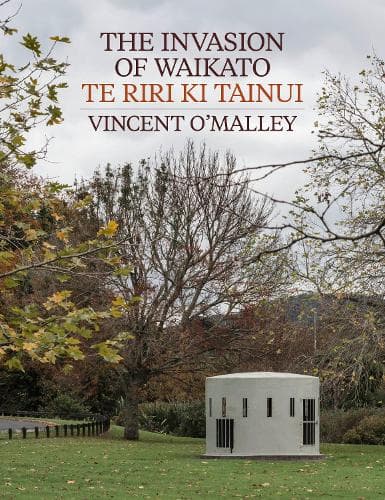Review: The Invasion of Waikato: Te Riri Ki Tainui
Reviewed by Sarah Ell
After many decades of being swept under the rug, the New Zealand Wars are back to being very much part of our national consciousness (Pākehā consciousness, that is; for Māori this painful history has been impossible to minimise or forget). In recent years, we have seen the story of this turbulent period added to the national school curriculum; the introduction of a national day of remembrance (He Rā Maumahara, 28 October) and an increase in commemoration events; the opening of new memorials and visitor facilities at significant sites; and a number of formal apologies. The events and effects of the wars are also increasingly visible in the arts and popular culture, including books such as Stacy Gregg’s Nine Girls (winner of the 2024 Margaret Mahy Book of the Year Award) and movies such as Ka Whawhai Tonu, directed by Michael Jonathan and presented almost entirely in te reo.
There has also been an increase in scholarship and on publication of non fiction works, one of the most significant being Vincent O’Malley’s monumental The Great War for New Zealand (BWB, 2016). The Invasion of Waikato is a more concise retelling of the story of the Waikato wars and their aftermath, drawing on both the original book and more recent research. It looks not only at the events leading to war in 1863 and the significant engagements that year and the next, but also the long tail of these events, which has stretched for over a century and still resonates today.
This is not a book for military enthusiasts, about guns and casualties: after summarising the individual battles, well over half the book deals with the long-term impacts and consequences of the war, including land confiscation, the socio-economic impact of the war and land loss for Māori, negotiation and Treaty settlement, and how and where we can remember the war today.
It confronts truths some readers may find uncomfortable; the slaughter by colonial troops of Māori women and children at Rangiaowhia in 1864 (O’Malley notes that even in the mythologising of the war that followed, ‘There was simply no way to describe the deliberate burning to death of Māori . . . that would be consistent with the preferred Pākehā narrative of the war as a chivalrous and noble combat between two peoples who later became friends’); the wholesale confiscation of more than a million acres of land, to the benefit of a handful of speculators; the repeated denial of appeals for justice and compensation. O’Malley states:
'Dispossession, impoverishment, exile and loss resonated over generations in the aftermath of the invasion, and can still be seen in the negative socio-economic and other statistics. Tainui and others live with the consequences of the Waikato War 160 years later. That is just how shattering it was.'
O’Malley’s clear and concise style makes the book easy to read, even if the content doesn’t make for easy reading. The book is well illustrated with relevant images and maps, and the type is a decent size — it doesn’t have the look or feel of a textbook. It also casts contemporary light on the conflict and its effects through the inclusion of a series of single-page profiles of New Zealanders who are actively involved in bringing its stories to light, through research and commemoration.
The day I received this book to review coincided with the death of Māori king Tuheitia, which added resonance and relevance to the reading of it. Governor George Grey might have set out to exterminate the King movement, to ‘dig round him till he falls of his own accord’, but nothing could be a better illustration of Grey and the British Empire’s failure to do this than the thriving of the King Movement today.
O’Malley writes that ‘the defining conflict in New Zealand history did not take place on the Western Front, or at Gallipoli, or in North Africa. Instead, it happened right here.’ This book will go a long way towards restoring the Waikato War to its rightful place in our history, and to stimulate discussion about how we can best remember it and reflect on its impacts.
Sarah Ell is an Auckland-based editor, researcher and writer, with a BA in History from Massey University and a Masters of Creative Writing from the University of Auckland.
